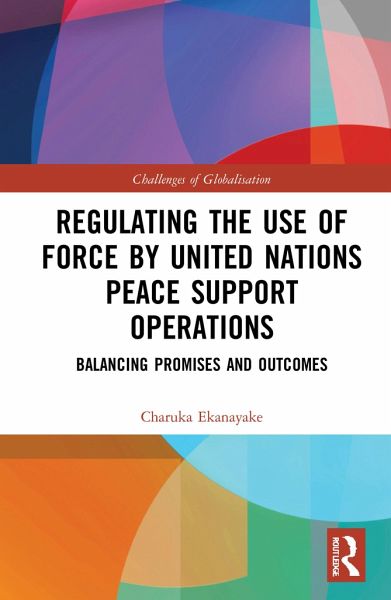
Regulating the Use of Force by United Nations Peace Support Operations
Balancing Promises and Outcomes
Versandkostenfrei!
Versandfertig in 1-2 Wochen
167,99 €
inkl. MwSt.

PAYBACK Punkte
84 °P sammeln!
This Book attempts to deduce regulatory standards that can close the gaps between the Promises made and the Outcomes secured by the United Nations in relation to its use of force. It explores two broad questions in this regard: why the contemporary legal framework relevant to the regulation of force during Armed Conflict cannot close the gaps between the said Promises and Outcomes and how the 'Unified Use of Force Rule' formulated herein, achieves this. This is the first book to coherently analyse the moral as well as legal aspects relevant to UN use of force. UN peace operations are rapidly c...
This Book attempts to deduce regulatory standards that can close the gaps between the Promises made and the Outcomes secured by the United Nations in relation to its use of force. It explores two broad questions in this regard: why the contemporary legal framework relevant to the regulation of force during Armed Conflict cannot close the gaps between the said Promises and Outcomes and how the 'Unified Use of Force Rule' formulated herein, achieves this. This is the first book to coherently analyse the moral as well as legal aspects relevant to UN use of force. UN peace operations are rapidly changing. Deployed peacekeepers are now required to use force in pursuance of numerous objectives such as self-defence, protecting civilians, and carrying out targeted offensive operations. As a result, questions about when, where, and how to use force have now become central to peacekeeping. While UN peace operations have managed to avoid catastrophes of the magnitude of Rwanda and Srebrenica for over two decades, crucial gaps still exist between what the UN promises on the use of force front, and what it achieves. Current conflict zones such as the Central African Republic, Eastern Congo, and Mali stand testament to this. This book searches for answers to these issues and identifies how an innovative mix of the relevant legal and moral rules can produce regulatory standards that can allow the UN to keep their promises. The discussion covers analytical ground that must be traversed 'behind the scenes' of UN deployment, well before the first troops set foot on a battlefield. The analysis ultimately produces a 'Unified Use of Force Rule', that can either be completely or partially used as a model set of Rules of Engagement by UN forces. This book will be immensely beneficial to law students, researchers, academics and practitioners in the fields of international relations, international law, peacekeeping, and human rights.












